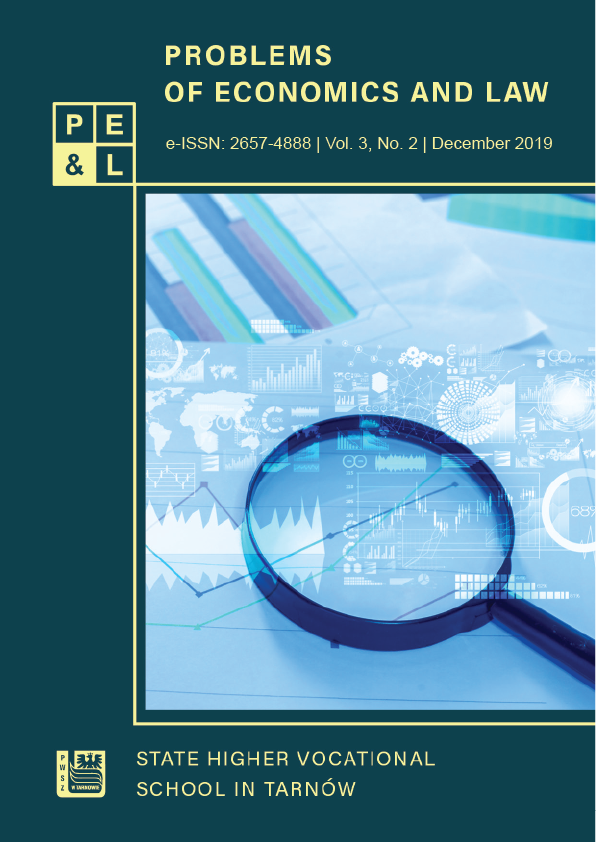Development of renewable energy source in Poland on the background of the European Union
DOI:
https://doi.org/10.5604/01.3001.0013.7218Keywords:
renewable energy, economic growth, energy consumption, GHG, OZEAbstract
The European Union’s policy on environmental protection and energy security is not only a set of regulations and bans. At the same time, it introduces new opportunities for economic development, it enhances ecological safety and contributes to public health protection by limiting greenhouse gas (GHG) emissions. This policy contributes to the development of renewable energy sources (RES) and those take an essential part in limiting consumption of basic energy sources and fossil fuels that are responsible for the current state and further deterioration of our environment. Environmental and energy education of our society has a significant impact on further development of renewable energy sources. It presents real dangers but also values derived from the development of green energy with the support of the state. It will bring a tangible improvement in the society’s quality of life.
Aim: The main purpose of the article is to attempt to determine the development of the renewable energy sector in the EU. The regulations, EU directives, laws and the current role of the state in the development of the renewable energy market were analyzed.
Materials and Methods: The source of the data was the extensive literature on the subject and Eurostat. This work used tabular, graphic and descriptive methods.
Results: Analysis show that energy safety and environmental protection are one of the greatest challenges of the 21st century. With the rapid depletion of conventional energy sourcesand the continued growing demand for energy, on which the growth of GDP depends globally, causes accelerated degradation of the environment, and with it , greenhouse gas (GHG) emissions. As far as energy safety and environmental protection is concerned, the policy of the European Union , through its actions,strives towards development of the renewable energy market . This in turn prevents the depletion of resources and environmental pollution.
Conclusions: The current EU situation, including countries like Poland, shows that the development of renewable energy is one of the most pressing issues in modern management, where renewable energy plays a key role in protecting the environment, public health and economic growth. It also prevents resource depletion, environmental pollution and reduces greenhouse gas emissions. It sometimes occurs with the opposition of the private sector and its citizens. To a large extent it is dependent on the availability of financial support from the state.
Downloads
References
Rogelj R., Shindell D., Jiang K., Fifita S., Forster P., Ginzburg V., et al. (2018). Mitigation pathways compatible with 1.5°C in the context of sustainable development. In: V. Masson Delmotte, P. Zhai, H. O. Pörtner, D. Roberts, J. Skea, P.R. Shukla, editors, Global warming of 1.5°C. An IPCC Special Report on the impacts of global warming of 1.5°C above pre-industrial levels and related global greenhouse gas emission pathways, in the context of strengthening the global response to the threat of climate change, sustainable development, and efforts to eradicate poverty.In Press. Available from: https://www.ipcc.ch/sr15/chapter/2-0/ [Accessed August 2019]. Google Scholar
Olczak K. (2016). Polityka Unii Europejskiej w odniesieniu do odnawialnych źródeł energii – ramy prawne. Studia Prawno-Ekonomiczne, 87-97. Google Scholar
Sowa S. (2018). Odnawialne źródła energii jako czynnik wpływający na poprawę efektywności energetycznej. Instytut Gospodarki Surowcami Mineralnymi i Energią Polskiej Akademii Nauk. Zeszyty Naukowe Instytutu Gospodarki Surowcami Mineralnymi i Energią Polskiej Akademii Nauk 105, 187-196. Google Scholar
Samuelson PA., Nordhaus WD. (2012). Ekonomia. Na podstawie najnowszego dziewiętnastego wydania oryginału. Wydanie na postawie Economics. Nineteeenth Edition. Poznań. Google Scholar
Lewandowski WM. (2012). Proekologiczne odnawialne źródła energii. Wydanie IV. Wydawnictwo WNT. Warszawa. Google Scholar
Janik W., Kaproń H., Paździor A.(2018). Uwarunkowania rozwoju produkcji energii elektrycznej na bazie źródeł odnawialnych. Rynek Energii. Google Scholar
Szuber-Zarzeczny U. (2007). Społeczne aspekty interwencjonizmu państwowego w gospodarce na przykładzie wybranych państw Unii Europejskiej (w:) Polityka Gospodarcza Unii Europejskiej, Katedra Mikroekonomii Uniwersytet Szczecińskiego, 39-51. Google Scholar
White Paper.(2018). Accelerating Sustainable Energy Innovation. World Economic Forum. May. Google Scholar
Commission Report to the European Parliament, the Council, the European Economic and Social Committee, the Committee of the Regions, and the European Investment Bank. (2019). Fourth Report on the State of the Energy Union, p. 4. Brussels, 9 April 2019. COM, 175 final. Google Scholar
Energy Sector Strategy 2019-2023 as approved by the Board of Directors at their meeting of 12 December 2018. European Bank for reconstruction and Development. Google Scholar
Kooija HJ., Otemana M., Veenmana S., Sperlingb K., Magnussonc D., JPalmcd J., Hvelplundb F. (2018). Between grassroots and treetops: Community power and institutional dependence in the renewable energy sector in Denmark, Sweden and the Netherlands, Energy Research & Social Science 37, 52-62. Google Scholar
Costa A., Sanchez P., Macron E., Canete M. (2018). Lisbon Declaration, Lisbon. [Online]. Available:https://ec.europa.eu/info/sites/info/files/lisbon_declaration_energyinterconnections_final.pdf. (Accessed 5 September 2018). Google Scholar
Ouyang T., Huang H., He Y., Tang Z. (2020). Chaotic wind power time series prediction via switching data-driven models, Renew Energy 145 270-281. Google Scholar
Terrapon-Pfaffn J., Dienst C., König J., Ortiz W. (2014). A cross-sectional review: Impacts and sustainability of small-scale renewable energy projects in developing countries. Renew Sustain Energy Rev 40, 1-10. Google Scholar
Simla T., Stanek W. (2020).Reducing the impact of wind farms on the electric power systems by the use of energy storage. Renew Energy 145, 772-782. Google Scholar
Księżopolski KM., Pronińska KM., Sulowska AE. (2013). Odnawialne źródła energii w Polsce (wybrane problemy bezpieczeństwa polityki i administracji. Dom Wydawniczy ELIPSA. Warszawa. Google Scholar
Eurostat data(https://ec.europa.eu/eurostat/statisticsexplained/images/4/4d/Share_of_energy_from_renewable_sources_in_gross_final_consumption_of_energy%2C_2004-2017). Google Scholar
GUS 2018 – Energia ze źródeł odnawialnych 2017 r. Google Scholar
The International Renewable Energy Agency (IRENA) Report: Renewable Power Generation Costs in 2017-2018. Google Scholar
Downloads
Published
How to Cite
Issue
Section
License
Copyright (c) 2019 State Higher Vocational School in Tarnow, Poland & Authors

This work is licensed under a Creative Commons Attribution-ShareAlike 4.0 International License.





